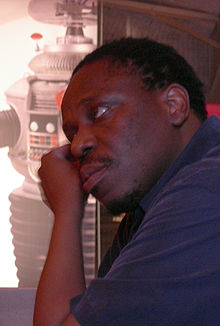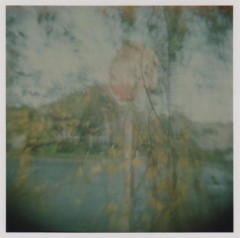Editorials Deepa Bhandaru — January 20, 2014 10:56 — 1 Comment
The Monarch Drinks With Charles Mudede
Housed in one of the old brick and stone buildings that is vintage Pioneer Square, E. Smith Mercantile recalls the settlers that migrated to the Pacific Northwest more than a century ago. Its design pays homage to this piece of Northwest history, with a general store in front and a small bar in the back. Making my way through the dimly-lit maze of perfume bottles and tea tins, blocks of soap and leather bags, I find Charles Mudede seated at the bar, looking over the drinks list. Mudede is thinking of reviewing the place for The Stranger, where he is Associate Editor, and he requested that we meet here. When he first mentioned the venue, my reaction was skepticism:
“Two post-colonial subjects drinking at a bar named after the glory days of settler colonialism?â€
“How else could the magic last!†he responded.
As if to exaggerate the incongruity of time and place, Mudede asks me if I drink dry bubbly and orders a bottle of champagne, which we share. I probe him about his work, and he discusses a film installation that he and local filmmaker Rob Devor recently debuted at the Museum of Northwest Art in La Connor. The film follows an airline pilot who has a psychological breakdown mid-flight and is grounded in a Seattle hotel room as a result. The pilot manages to escape his confinement and break into the city’s park system, where the film is shot. Inspired by true events, the film tells the story of an unusual crime by weaving together bits of the pathological, surreal, and absurd. Similarly, Mudede’s two feature films, Police Beat and Zoo, which he also produced with Devor, use the Pacific Northwest as the backdrop to explore the terrain of bizarre criminality.
“These questions of what constitutes a crime, why people are interested in crime, how we know that something is criminal… The Northwest is a great place to think about these things, because we don’t have as much of the horrific crime as, say, a huge city like Los Angeles or Washington D.C. What we see here are some really strange things,†says Mudede. The bartender pours us another round of drinks, and I look up at the back wall, where I find a stuffed deer’s head, antlers intact, cloaked in an old state flag.
“I was really interested in Zoo,†I tell him, referring to his 2007 film about zoophilia, which chronicles the events surrounding the death of an Enumclaw man who had sex with a horse. In discussing zoophilia, we establish our mutual admiration for Michel Foucault, the 20th century French philosopher known for his work on modern techniques of policing. Mudede is excited to relate the film to Foucault’s work.
“When I made Zoo,†he begins, “I was very influenced by Foucault’s lectures on abnormality. I wanted to look at a group that was outside the mainstream. I was interested in how the public was disgusted by what these people were doing. At the same time, we had a war in Iraq and it seemed so bizarre that you would not be disgusted by someone lying to you to justify going over there to kill.â€
“One of the things that struck me about Zoo was how the community of zoophiles describes having sex with animals as very natural,†I observe. “Horses, for instance, respond to our pheromones, because we are animals like them. Zoophiles seem much more comfortable with our animal nature.â€
“In the days before the Internet, if you were a person who loved animals and wanted to have sex with animals, there was no bar you could go to…â€
“You would have to go to a barn,†I joke, although it lands flat on Mudede, who is following his train of thought.
“You would be radically isolated,†he continues. “Suddenly, a technology shows up that allows you to connect, anonymously, to others who also love animals. And that’s the Internet. We always imagine technology as taking us forward into this unchartered future. I was fascinated by this idea that technology could take us back to a past when we weren’t so divided from animals, when we were really aware of our similarities with animals. I think the notion that we are human beings is a late development that wasn’t there from the start.â€
He describes another film he would like to make, this one shot in his native Zimbabwe, about a detective trying to solve a serial murder case. The wrinkle in this story is that “the reports he’s getting are a mixture of reality and superstition. In order to solve this crime, he has to navigate the world of spirits, and to figure out what people’s stories about the spirits are really saying. In a place like Zimbabwe, the spirit world is integrated in everyday life. There isn’t the same division that the West imposes.â€
“Kind of like how the zoophiles experience a continuity between humans and animals,†I add.
“Exactly.â€
I ask him about his relationship to Zimbabwe, and I learn that both of his parents were academics, his father an economist and his mother a psychologist. His parents’ careers brought him to the US when he was still in school, and he learned very quickly how to move between worlds. His accent is a testament to this movement, somewhere between British colonial (once during the conversation, he refers to me as “my dearâ€) and American intellectual.
“When I first went to University, I studied economics,†he tells me. “But since the 1960s, economics has been in decline. We haven’t had an economics profession in years. When I was in college, the neoclassicists had taken over, and it was all rational agents and modeling. I couldn’t do it. I decided to study literature instead.â€
“But you’re still interested in economics?â€
“Yes, very much so. It was actually Foucault’s lectures on biopolitics that pushed me further into economics. Much further than Marx ever did.â€
“That’s interesting. A lot of Marxists criticize Foucault for being too concerned with subjectivity and not concerned enough with economics.â€
“But that’s precisely why Foucault is interesting from an economics perspective! How in the world does labor become the center of a project that essentially decimates the power of labor? Reformulate labor to think that you are, as a being, a business. A project. You are walking in the world, you are calculating things, you are saying ‘How much does this cost? How much do I have? How much can I save? How much can I make? How much can I beat you at the game?’ Foucault develops a consciousness for the homo economicus model… Marxists don’t see that the entrepreneurial model has replaced the labor model. You have a whole generation who believes in entrepreneurs, who’s waiting in line to be Bill Gates.â€
“What does this mean for the working class?†I wonder.
“Neoliberalism has this power to dominate from within, so that there really isn’t this distinction between the working class and the capitalist class. At least not in the classical Marxist sense.â€
“Right, which is why even the One Percent are still working all the time. They just get more rewards for their work. They might argue that it’s because their work is more efficient…â€
“So, there’s the question of inequality, and then there’s the question of leisure. Both are important, but I’m interested in how we can revive an interest in leisure. Nobody on the Left takes it seriously. There can’t be a proper revolution without understanding what people do with their free time. Right now, all leisure is tied to work. Vacation is a way to recharge so you can work again, be even more efficient with your time.â€
By now the bar is full. A couple enters, recognizes Mudede, and stops by to say hello. He shifts gears effortlessly, bracketing our conversation on socioeconomics to exchange pleasantries with the newcomers. I gather that she is an artist, and they talk about her most recent show. I take a moment to glance around the bar. I can’t help but notice that we are the darkest people there, phenotypically and perhaps existentially as well.
He wraps up his conversation with the couple and turns to me again, injecting subversive lyrics into the old time music playing in the background. “I owe my soul to the company store!†he sings, chuckling, a reference to the folk song “Sixteen Tons.†And then he adds, “You think I’m too comfortable with white people, don’t you?â€
I am caught off guard. How does he know? Before I can answer, he continues: “My mother was an Anglophile. She thought that Shona [one of Zimbabwe’s native languages] was a dying language, so she made us speak in English. My father, he would come home and eat traditional food, with his hands. But we would eat rice and potatoes with forks and knives. My mother discouraged us from thinking about race. I’m not saying that this was good, or that I don’t ‘see’ race.â€
“But I guess to make it in a city like Seattle, you have to be comfortable with white people, with their sensibilities,†I offer. “Maybe it’s appropriate for us to meet here, in this place that’s trying to recreate the American frontier.â€
“We are the American frontier,†he replies. I wait for him to say “my dear†to make the sentence rhyme, but he doesn’t. Instead he suggests, “How about we get out of here, go somewhere a little less… contrived. I know a place up on Beacon Hill that I think you’re going to love.â€
One Comment
Leave a Reply
The answer isn't poetry, but rather language
- Richard Kenney





I wish I could have come along to the second place you two went. I’d have had fun talking about the intersection of economics and crazy and crime. The zoophilia less so, unless I was allowed to draw on the napkins.